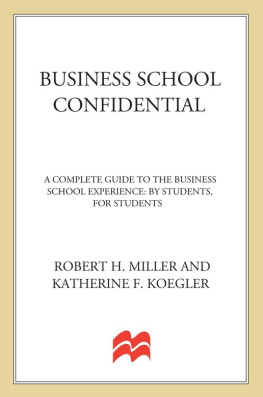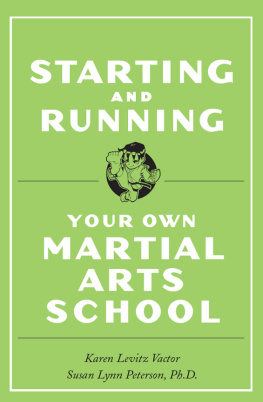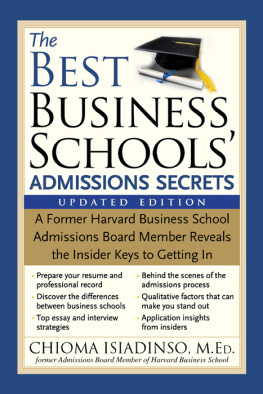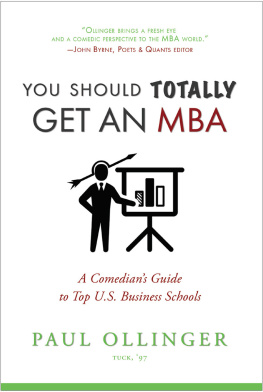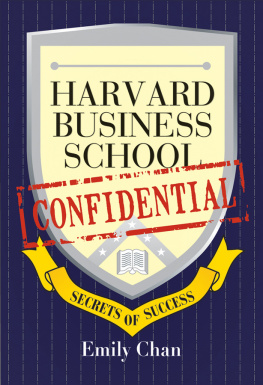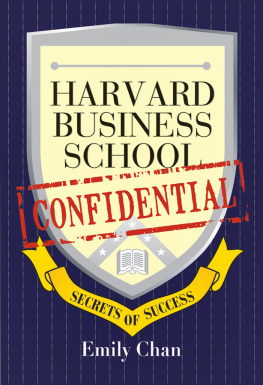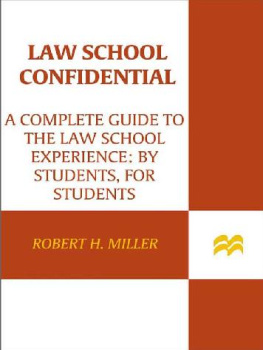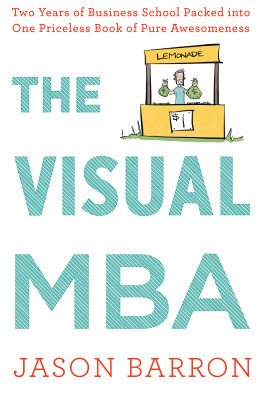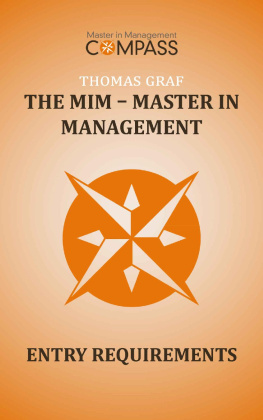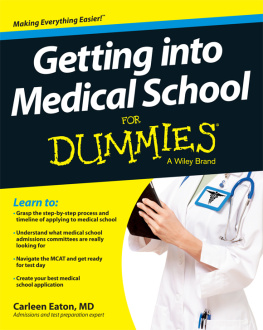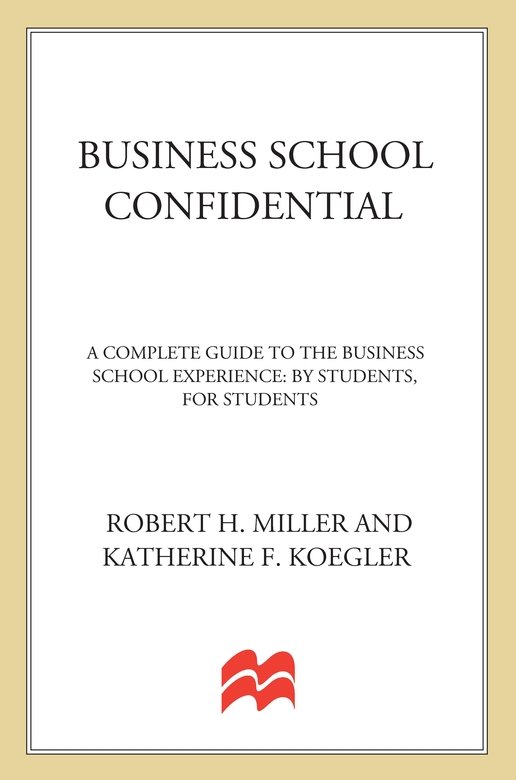
P UBLISHING A BOOK is very much a team effort, and the one you are now holding in your hands would not exist without the hard work, enthusiasm, and devotion of many people working tirelessly behind the scenes who richly deserve to be called into the spotlight to take a bow. First, a CB-Club-level boomalacka to our literary agent, Jake Elwell, for his terrific stewardship of this project, for his constant encouragement, reliable wisdom, and, most of all, his friendship. You could not ask for a steadier hand or a better guide on the long road from the blank page to the finished product.
To our editor, Carolyn Chu, who took over this project in midstream but didnt miss a beat, shepherding it along with patience and enthusiasm, providing the encouragement to keep the pages coming, and making the suggestions to ensure that the finished product lives up to the hype.
To Kristine Laca at the Tuck School of Business for taking so many hours out of her incredibly busy travel schedule to sit down with us and share such a refreshingly candid look at the admissions process, which, we trust, will bring smiles and comfort to applicants everywhere. Trust us when we tell you: you wont find a more devoted Director of Admissions anywhere.
To Kim Keating at the Tuck School of Business for her generous assistance and enthusiasm, and to Sean Gorman at Sheehan, Phinney, Bass & Green for making the necessary introductions!
To Vernon Loucks, CEO of Segway; Jeff Bezos, CEO of Amazon. com; Ed Whitacre, CEO of SBC; Jim McNerney, CEO of 3M; and Larry Bossidy, CEO of Honeywell, for taking the time away from their management duties to discuss the merits of business school with us, and sharing their valuable insights on when and how going to business school can matter most.
To Charles Chuck Knight, chairman and former CEO of Emerson Electric, for honoring us with the contribution of his foreword to this book.
To our outstanding mentoring team: Brett, Amy, Matt, Kanna, Andy, Anne, David, Alden, David, and Toby for finding the time in your busy schedules to animate the pages of this book with your stories and your valuable counsel. We are honored to be associated with all of you for posterity in the pages of this book.
To Christine Aebi, with sincere thanks for your first-rate copy-editing skills.
And, finally, to Carolyn, who greeted us, wide-eyed, with Youre going to do WHAT?! when we announced our plans to write this book while both of our families were in the process of expansion. Thank you for your support, your love, your encouragement, and for picking up the slack for lo those many months when we retreated to the glow of the midnight oil to advance the cause a few pages further.
Law School Confidential
ROBERT H. MILLER, thirty-one, graduated in May 1998 from the University of Pennsylvania Law School, where he was a senior editor of the University of Pennsylvania Law Review , and H. Clayton Louderback Legal Writing Instructor, and the Chairman of the Executive Committee on Student Ethics and Academic Standing; and from Yale University in 1993. He is an attorney with the law firm of Sheehan, Phinney, Bass & Green in Manchester, New Hampshire, where he specializes in business and intellectual property litigation. He is the author of the critically acclaimed law school preparatory book, Law School Confidential . Mr. Miller lives in the village of Hopkinton, New Hampshire, with his wife, Carolyn, and son, Nicholas.

KATHERINE F. KOEGLER, twenty-eight, graduated from Northwestern Universitys Kellogg Business School in 2001, with concentrations in entrepreneurship, marketing, and finance. Prior to business school Ms. Koegler helped start and grow an e-commercebusiness focused on improving patients understanding of their illness and medical procedures and communication with their physician.
Ms. Koegler graduated from Yale University in 1996. She currently resides in Denver, Colorado.
So You Wanna Get an M.B.A.
Know the right moment.
THE SEVEN SAGES
I T PROBABLY COMES as no surprise to you that pursuing a masters degree is an expensive and time-consuming proposition. Leaving a solid, well-paying job to pursue an M.B.A. should be a carefully considered and calculated decision. Before committing two years of your life; at least $60,000 in tuition, fees, and housing; and the opportunity cost of the experienceask yourself the following questions and force yourself to really think through your honest responses to them. It may help to actually write your answers down. Taking the time to do this will make it easier to carefully and properly evaluate business school as a next step in your career.
Why do I really want to go to business school?
There are many possible responses to this question, and most business school applicants actually have more than one. Many of these reasons are well thought-out and will empower your experience. Others, however, should not be the premise upon which you decide to apply.
I think deciding whether or not to go to business school is amatter of figuring out where your interests lie, Dave notes. If you are happy working in the accounting sector or the marketing sector and have no desire to cross over into other areas in the future, then you may not need to go to business school. If you want to explore new areas of business, grow your understanding of how business works, and give yourself the option of moving around in the future, then you should give serious thought to business school.
Andy agrees. I would encourage anyone thinking about applying to business school to carefully evaluate their career objectives. The fact of the matter is that too many people have a great deal of uncertainty about that. The most important step is to figure out what it is that you really want to do, and to do that before you apply.
When I first applied to Wharton in 1996, I had no idea what I was looking to get out of my business school education. I could not articulate the value that an M.B.A. would have for me. It was only the second time around, after a great deal of independent research and countless conversations with other business school graduates that I appreciated why it was that I wanted to go to business school, Brett admits. You want to be able to look at your career to date, and specify exactly how getting an M.B.A. will help you grow, both professionally and personally.
Okay. So this is the time of reckoning. Check to see if one or more of your reasons for applying to business school appears on this list:
I kicked ass on the GMATI cant ignore that, can I?
I hate my job, so this will be my way out.
The economy stinks, and I just got laid off, so why not go back to school?
This is what all my friends are doingthey cant all be wrong
Everyone else in my firm has an M.B.A.
I dont understand science, so med school is out, and law school requires too much reading. What else is there?
If your primary reason for applying to business school is represented by one or any combination of the responses from the list aboveslam on the brakes! Its time to spend some more time considering your motivations. Follow along, and youll see why.

